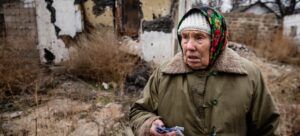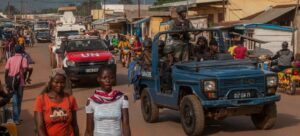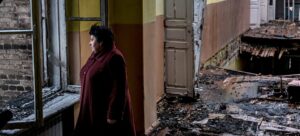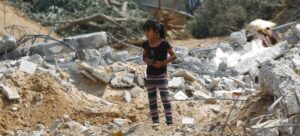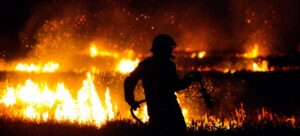“It is time for restraint, reason and de-escalation. There is no place for actions and statements that would take this dangerous situation over the abyss”, he said, calling for a ceasefire, dialogue and negotiations to save the people in Ukraine and beyond from the scourge of war.
He also encouraged all parties to make full use of Article 33 of the UN Charter and its “diverse instruments of pacific settlement of disputes”.
‘Grave concern’
The Secretary-General described the latest developments as “a cause of grave concern”, including reports of increased ceasefire violations across the contact line and “the real risk of further escalation on the ground”.
While acknowledging that the history of the conflict is complex, he underscored that in the present situation one thing is clear: “The decision of the Russian Federation to recognize the so-called ‘independence’ of Donetsk and Luhansk regions – and the follow-up – are violations of the territorial integrity and sovereignty of Ukraine and inconsistent with the principles of the Charter of the United Nations”.
Sovereign equality of States
Mr. Guterres emphasized that Russia’s actions are also inconsistent with the Declaration on Principles of International Law Concerning Friendly Relations – a landmark resolution adopted by the Assembly more than half a century ago.
The so-called Friendly Relations Declaration sets out several vital principles that are “highly relevant” to today’s session, he reminded the Member States.
The UN chief highlighted the principle of sovereign equality of States, affirming that their territorial integrity and political independence are inviolable.
“Other General Assembly resolutions are also fully behind the sovereignty, political independence, and territorial integrity of Ukraine, within its internationally recognized borders”, he said.
Minsk Agreements
The UN chief continued by describing the Minsk Agreements – the fragile peace process regulating the conflict in eastern Ukraine – as surviving “in an intensive care unit thanks to a number of life support devices.”
“But now those devices have been disconnected”, he stated.
Mr. Guterres also flagged the need to preserve the integrity of peacekeeping, which he spelled out only takes place “with the consent of the host country”.
Consistent humanitarian commitment
Through its human rights and humanitarian work, the Organization continues to support the Ukrainian people.
“Our Human Rights Monitoring Mission has seven offices throughout the country – on both sides of the contact line – documenting civilian casualties, monitoring freedom of movement, and reporting on allegations of human rights violations”, the top UN Official reminded the Assembly.
Flagging that UN humanitarian operations are “independent of whoever might control the territory where people are living”, he pointed out that even before this latest escalation, two million Ukrainians had needed humanitarian assistance.
“Since the start of 2022 alone, we and our partners have delivered 140 metric tons of life-saving aid across the contact line”, he said.
UN humanitarian assistance is guided by the four principles of humanity, neutrality, impartiality, and independence – all central to establishing and maintaining access to affected people, including those in the context of an armed conflict.
“Our humanitarian agencies are committed to staying and delivering to support the people in Ukraine, and are ready to adjust and reprioritize their operations as necessary”, he attested.
Relentless search for peace
Noting that during conflict, civilians, including women and children, always suffer first and most, the UN chief warned that if the conflict in Ukraine expands, “the world could see a scale and severity of need unseen for many years”.
“I urge all sides to allow safe and unimpeded access by humanitarian agencies, including in non-Government controlled areas of eastern Ukraine,” he said, urging all parties to uphold their obligations under international humanitarian law.
In closing, the Secretary-General reiterated his full commitment to supporting all efforts to “resolve this crisis without further bloodshed”, offering his good offices.
“We cannot and will not relent in the search for a peaceful solution”, he said.
Give peace a chance
Assembly President Abdulla Shahid told the participants that if the last 76 years of the UN’s existence has taught us anything, it is that that “lasting peace is not achieved nor sustained by military engagements, but through political solutions.”
He urged the Member States to “deploy the tools that we have to resolve disputes…give priority to diplomacy, good offices and mediation… [and] give peace all the chance it deserves”.
“I call on the parties to intensify their negotiations and deescalate the current trajectory through dialogue”, underscored Mr. Shahid.
‘More than hope’ needed
Meanwhile, Ukraine Foreign Minister Dmytro Kuleba said that while hope for peace, common sense, and diplomacy dominate Ukrainian mindsets, “today we need much more than hope”.
“We need swift, concrete and resolute actions” relevant to the threat level of “Russia’s aggressive course,” he stated on behalf of more than 40 million Ukrainians who wish is to live in peace and prosperity, “not in fear, intimidation, not under Russian fire, bombs and shelling.”

UN Photo/Evan Schneider
Foreign Minister Dmytro Kuleba of Ukraine addresses the UN General Assembly on the situation in the temporarily occupied territories of Ukraine.
Largest European security crisis since WWII
Unlike the Second World War, Mr. Kuleba pointed out that the current crisis was created by one side unilaterally: Russia.
The Foreign Minister attested that Russian President Vladmir Putin “overtly denied Ukraine’s right to exist”, saying that “we all need to admit the grim reality of a new aggressive and revanchist dictatorship rising over Europe”.
He asserted that Russia has attacked the UN’s fundamental principles of international peace and security and “the very existence of the Ukrainian State”.
“What is happening right now in the Eastern Ukraine, where Russian tanks are rolling in, and along the Ukrainian borders, where Russian forces are amassed in enormous quantities, must be a concern for everyone,” Mr. Kuleba said.
“I warn every nation…no one will be able to sit out this crisis if Putin decides that he can move forward with his aggression against Ukraine…[which] is why we need to use this last chance for action and stop Putin where he is. It is clear that he will not stop by himself”.

© UNICEF/Ashley Gilbertson
An abandoned school, damaged after a shell strike, in Krasnohorivka, Donetsk Oblast, Ukraine. (file)
Offenses on the table
The Ukrainian official asserted that Russia’s “propaganda machine is in full swing”, creating a pretext for further aggression against his country.
“Russia has literally stuffed the Black Sea and the Sea of Azov with 46 military vessels…routinely closes large parts of the seas under the pretext of holding naval exercises [which] amounts almost to a blockade of Ukrainian seaports…and continues to block the release of illegally detained persons.”
And as the occupying power in Crimea, he upheld that Russia persists in destroying the identity of Ukrainians and the indigenous Crimean Tatars, insisting that the situation there remains open and that Ukraine continues efforts to de-occupy Crimea “by peaceful means.”
Ukraine owed protection
Reminding that Ukraine denuclearized in 1994, giving up the world’s third largest nuclear arsenal, he said: “The world owes Ukraine its security”.
“We expect the international community to do their best to put out the fire in the centere of Europe, which is about to flare up”, he added.
“Russia must withdraw its forces from the sovereign territory of Ukraine and stop destabilizing the international security situation.”

UN Photo/Evan Schneider
Ambassador Vassily Nebenzia of Russia addresses the UN General Assembly on the situation in the temporarily occupied territories of Ukraine.
Russia takes the podium
Meanwhile, Russia’s UN Ambassador, Vasily Nebenzya, started his speech with “a clarification” that the name “temporarily occupied territories” was incorrect as the meeting is actually about “the territories lost as a result of misanthropic politics” of Ukraine.
He went on to say that with Russia’s recognition of “the Luhansk People’s Republic (LPR) and the Donetsk People’s Republic (DPR), this conflict is far from over”.
Mr. Nebenzya said that the shelling of peaceful quarters of both have not stopped and that Kiev remains armed and continues to incite and encouraged violence.
He warned that at the request of Donetsk and Lugansk, Russia will continue to monitor the regime ceasefire and that its armed forces will not tolerate violators.
“Therefore, I urge you today to focus your efforts on calming down Kiev and keeping it from new military adventures that could cost the whole of Ukraine dearly.” the Ambassador said.
